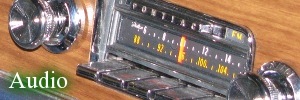















Japanese Carmakers Outrank Europeans in Reliability Survey |
|---|

|
John Birchard
July 16, 2003
Washington, D.C.
Audio Version 374KB RealPlayer
For some folks, horsepower and exciting styling are the motivating factors for buying a car. But, for the majority of Americans, a car's reliability is a major concern.
The international marketing information firm JD Power and Associates has published its 2003 Vehicle Dependability Study, considered by many a benchmark for long-term vehicle quality and reliability in the auto industry.
The study is based on responses from more than 55,000 original owners of 2000 model year cars and light trucks whose vehicles have spent three years on real world roads.
"European brands in particular have really lost a lot of competitive ground in terms of dependability," said Brian Walters, director of product research. "And now, are among the vehicles that have the most number of problems after three years of ownership and considerably more problems than domestic-branded vehicles. So the edge that the Europeans once had has slowly been whittled away and now they're really at a competitive disadvantage."
As expected, Toyota and Honda did well in the survey, says Brian Walters.
"Lexus has performed extremely well. Infiniti has done fairly well historically in this study. And Buick is our number three nameplate, the best domestic nameplate in the study and the best non-luxury model. That means Buick is better than the average Toyota and Honda vehicle. So, Buick has quite something and [corporate parent] General Motors in general has something - to be proud of," he said.
If there is a big loser in this survey of long-term quality it may well be Germany's famed Mercedes Benz. JD Powers' Brian Walters says the former luxury leader's problems seem to multiply with a vehicle's age.
"Well, Mercedes Benz is the one, the nameplate that declines most rapidly between initial quality and three years in service," he said. "But the other luxury European brands, including Volvo and Land Rover and Audi, also decline fairly rapidly and they're among the most rapidly declining vehicles in quality. So, it's an issue for all the European luxury brands as well."
Conversely, some vehicles start out rather poorly when new, but show up better with time.
"The most dramatic is Subaru. Subaru did not perform as well when the vehicles are new and, in fact, in the 2000 Initial Quality Study, Subaru was well below the industry average," he said. "After three years in service, however, Subaru finishes above the industry average, well above the industry average, primarily because they deteriorate more slowly than other brands in the industry."
Mr. Walters credits Toyota for the increased attention to reliability throughout the industry.
"They led the charge, if you will, at improving, at making this a top priority. Other nameplates and other corporations have slowly followed. And now I think the industry as a whole has a great deal more focus on long-term dependability," said Mr. Walters.
According to JD Power, 52 percent of America's new car buyers base their purchases on that very quality.
